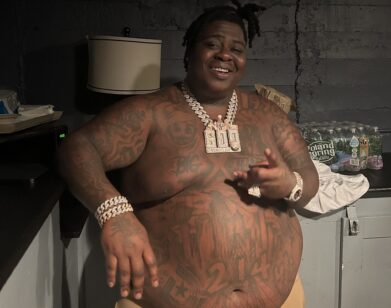The Raconteurs
Ace ax-men Jack White and Brendan Benson called up some friends and built a band that’s the best in the land. Photographer Craig Mcdean and writer Jonathan Durbin got on the bus and on the stage, up close and personal.
The Raconteurs are a Frankenstein’s monster of an act, stitched together from various rogue agents and bits of other bands: singer-songwriter Brendan Benson on vocals and guitar; Patrick Keeler and “Little” Jack Lawrence of the Greenhornes on drums and bass respectively; and, of course, Jack White, whose other musical outfit (the one with the limited color palette) you may have heard of. And as you might infer from the group’s name, the art of telling tales-sometimes tall ones-is baked into their DNA. The quartet’s music, though garage-rock to the core, borrows from country, bluegrass, and blues-all narrative-heavy genres and each a venerated, corn-fed mode of expressing old-fashioned American myth.
Like the best storytellers, the Raconteurs are also not afraid to embellish or improvise in order to hold the attention of a crowd. During their live shows, the band constantly reinterprets their songs-sometimes so much so that they are only vaguely related to the studio versions. Their material is suited to that sort of reimagining: Consider the group’s second full-length album, Consolers of the Lonely (Third Man/Warner Bros.), which features its share of gothic parables, such as “Carolina Drama,” a song about a boy who kills his mother’s boyfriend, and “The Switch and the Spur,” in which a fugitive escapes from jail only to be poisoned in the desert. The Raconteurs also know how to cause a stir. This past March, they flouted music-industry convention by announcing that they were going to put out Consolers only a week before its release. The idea might have been to bring some of the pre-digital-era magic back for fans by surprising them-as much as it’s possible to surprise anyone these days. Or maybe it was an attempt at a little mythmaking. In any case, it’s worth noting that in Australia, the Raconteurs call themselves the Saboteurs. (The name the Raconteurs was already taken by a jazz band.) Read into that what you will.
JONATHAN DURBIN: You took a lot of people by surprise when you released Consolers of the Lonely on every format all at once, with almost no warning. What was the thinking behind that?
PATRICK KEELER: We cooked up the idea in the studio: What if we just skipped all the bullshit that surrounds a record release?
JACK WHITE: It all boils down to fear and where the music industry is at right now. The labels are really scared about how to do things right, and that usually results in a lot of preplanned trickery, meaning releasing a record on a different format with bonus tracks or having the vinyl come out two weeks after the CD. We were just like, “Let’s put everything out the same day.” No one knows how to sell records anymore. They’re just trying to do anything they can to stay current with what’s hip this week on the Internet.
BRENDAN BENSON: Another thing is that the whole three-month lead-in idea that’s overtaken the music industry is a Hollywood invention. The movie industry places such importance on first-week numbers-which means what to people, I don’t know. It’s very strange. They hope to sell tons of records the first week, and then what?
JD: It seems like not that long ago, people would be excited that a band they liked was releasing
a record, but they would know almost nothing about it until it came out.
JW: You’d know nothing about it, not even the name. Now, because everything is given to you in spades on your laptop immediately-YouTube, iTunes, blogs, bands’ websites, and MySpace-you become disinterested very quickly because you’ve already got it all.
“LITTLE” JACK LAWRENCE: There’s no mystery. There is no romance.
JW: It’s very tough to compete with all that media. You’re almost constantly trying to tell people that there are these beautiful, romantic things that are involved with artistry and the reception of it, and that there are ways you can participate in and share that-ways that are tangible and emotional and don’t just involve a gadget in your hand or something invisible like digital music. These are real things that you can hold onto if you want to. But it’s hard to compete, you know? We’re trying. It’s like, “Hey, if you want our music on your cell phone or on iTunes or whatever, it’s there. But we’re still putting it out on vinyl and on CD so that it’s something tangible that you can hold onto.”
JD: Well, the Internet and digital music in general has really taken the focus off the work and put it on how you get it, the little details surrounding it, and the lives of the people making it.
BB: I could understand it if we were talking about, say, Picasso. I might want to know more about him as a person and his private life because I’m curious-he was a master at what he did. But the other day we were doing an interview for radio, and one of the guys there went through the questions with us beforehand just to make sure they were all cool. He had to take out things like, “What was the first car you ever bought?” I was like, “What’s up here? You want to break me down? You want to make me out to be a regular guy before I’ve even done anything?” I don’t think anybody wants a regular guy.
JW: But that’s the thing in pop culture now. Everybody wants to be like, “Hey, I’m just a regular guy like you. I get a six-pack and watch the game, just like you do.” Every comedian, every personality on television-that’s their schtick. Especially on reality TV. If there’s one thing that I can’t stand, which has become so popular in the last 10 or 15 years, it’s the attitude of, “You know what? It’s so great because so-and-so doesn’t take themselves too seriously.” It’s like, hold on a second: I want my artists to take themselves seriously. Of course, I do. Why wouldn’t I want that?
JD: When do you think that idea of personality or celebrity became so complicated? It seems like something happened-in rock music in particular-after Kurt Cobain’s suicide in 1994.
BB: Totally. Nirvana popularized that idea of, you know, forget about your bigger-than-life heroes and rock stars and cool, mysterious, backstage happenings. Kurt Cobain just came out and said, “Here I am. I’m a guy in a flannel.”
JW: But it was out of his guilt, his punk-rock guilt. He felt guilty about being famous because that wasn’t the aesthetic and the vibe of the punk-rock scene-to be successful, to be well known. Same with the garage-rock scene we came from.
BB: It was almost accidental, but Nirvana became huge, and so, of course, everyone tried to emulate them. And Kurt Cobain pioneered this new regular-guy thing.
JD: Except that he clearly wasn’t a regular guy.
BB: He actually was the real deal. Kind of ironically, he was a really talented-
LJL: Artist.
BB: Freak, yeah.
JD: The title of the new record, Consolers of the Lonely, came from an inscription on the wall of a post office, isn’t that right?
BB: Yeah. It’s on the old city Post Office in Washington, D.C. It’s from a poem called “The Letter” that’s engraved into the wall.
JW: We were looking for the phrase “Neither snow nor rain nor heat nor gloom of night.” I couldn’t remember how it went, looked it up, and instead found a gold mine of poetry.
BB: When we read the phrase “consoler of the lonely,” Jack and I looked at each other and were like, “That’s gorgeous.”
JD: Who’s the best storyteller among you guys?
JW: That would be Little Jack.
BB: Yeah.
JW: Don’t get him started.
BB: LJ’s got a legend-a legend about himself that is entirely untrue.
JW: Everything about him is entirely untrue.
BB: He’s just the man of mystery.
[Little Jack sits in silence.]
JW: I’ve always been jealous of people who can tell stories really well in a room with a bunch of people. I’ve never been good at it because I’m not cocky enough to be like, “Okay, everyone, listen right now to this. I’m going to blow your minds with this joke.” You know what I mean? To be like, “Okay, there we were in a log cabin, and I . . .” But when people can do it in a really interesting, polite way, I’ve always been envious of that. I can do it lyrically, in song, but I can’t do that in real life. It’s out of the fear of being so bold as to take control of the room. Who am I to stop everybody just to tell my stupid story? It’s presumptuous.
BB: My grandpa, though, was truly a raconteur-just a brilliant storyteller.
JW: Being old helps.
BB: But he read a lot, too, and was fascinated by language. He would tell these brilliant, hilarious stories that could go on for maybe a half hour, and you wouldn’t notice that it was a half hour. But the thing was, he was so quiet about it. He just commanded the attention. And he hardly ever spoke, unless it was something brilliant.
I have a tough time telling stories because it’s hard to be 100 percent truthful.‘Little’ Jack Lawrence
PK: It’s a beautiful gift, if you can do that.
LJL: I have a tough time with telling stories, because it’s hard to be 100 percent truthful. There’s always an embellishing of the truth, putting flairs onto a story to make it more interesting than it really is.
JW: I have trouble listening to people tell me about their dreams. Sometimes I’ll say, “Okay, but I have a caveat before you tell me about this dream: Do not use the words weird or strange.” It’s in every sentence: “There was this weird guy with this strange box in his hand. It was so weird!” That’s one of the things I hate.
PK: Wait-I wanted to know about what happened when you were in the log cabin, and now I want to know about the guy with the box in his hand.
JW: It was weird.
JD: The last song on the new record is a murder ballad called “Carolina Drama.” Is it based on a true story?
JW: Some of that had happened to me. I’d wanted to write a Southern tragedy. The first line I wrote was with Brendan, and I just said, “This is the story about Billy and his brother, and I’m going to tell it again.” That was all I had for a while. I wanted it to be so you couldn’t tell who was the protagonist or antagonist in the song. And I like that nobody has a name except for one person-Billy. Everybody is identified by how they relate to Billy, whether that’s his mother, his mother’s boyfriend, or his brother.
JD: “The Switch and the Spur,” about a poisoned outlaw, is also heavy on narrative.
BB: That actually was a true story. [laughs]
JW: That was a melody I had been playing for years and never had a spot for. Then finally, Brendan brought in the line, “In the heat of the desert sun,” and that chord change. I love that track.
PK: It’s one of my favorites to play.
BB: When we do it, I almost feel a little too contained. It’s like I want my face painted. I want dust. I want tumbleweed. Couldn’t we have tumbleweed for that one? To go right across the stage?
JW: I see a silhouette of a wolf behind us. Every other band right now has “wolf” in their name.
PK: And then at the end, Little Jack is in a barrel and he explodes.
JD: You guys take some liberties in interpreting the songs live.
JW: That’s it exactly. We want to interpret them live-we don’t want to re-create them.
LJL: It’s good for the audience and it’s healthy for us, too. You don’t want to be robotic up there.
JD: Is perfection the enemy of the good?
BB: I think so. I believe in that Asian philosophy where they make those beautiful porcelain statues, and then they take a whack out of them because it’s closer to God that way-it’s natural beauty.
JD: You recorded Consolers of the Lonely in the same place where the White Stripes’ last record, Icky Thump (Warner Bros.), was recorded.
JW: That’s right, at Blackbird [studio in Nashville]. We just kind of worked out all the kinks in that room.
BB: It’s a cool room. Great studio. Great gear.
JW: I did an album long ago called Sympathetic Sounds of Detroit [2001], where I recorded bands at my house. They came over, and we recorded on the same mics and the same amps and drum set, and yet, every song had its own vibe. So I knew we could do something totally different, especially with this band compared to the Stripes. Both of these records [Icky Thump and Consolers of the Lonely] were experiments for me because I always stayed away from the studio environment as much as possible. But I just wanted to see if I could work in one. It’s not easy. Just having an engineer’s assistant around is enough for me to be uncomfortable. With more than one person there in the room, it feels strange.
Being easier on yourself is not a good idea. I like making things harder.Jack White
JD: Isn’t all that stuff supposed to help?
JW: Yeah, it’s supposed to. It’s all geared to help. But to help you do what? Again, opportunity-I don’t agree with it. I think it kills creativity. Being easier on yourself is not a good idea. I like making things harder. A lot of fans of the Stripes and the Raconteurs say, “Oh, Jack always has guitar problems” or “Jack always has equipment problems.” I wish they knew that I’m doing this on purpose. Yes, I could go and buy a brand-new Les Paul and a brand-new Marshall amp stack and just plug in and everything’s fine. But I don’t want it to be that way. It’s too easy.
BB: You need a little resistance-something to fight against. I’m the same way about being in any studio. I’m always afraid, because I do most of my stuff at home, where nobody bothers me, and I don’t have to stroke somebody’s ego or be careful about hurting someone’s feelings. But I also want to know that I can still go into the world and be with other people and make music.
JD: Since the Raconteurs’ first album, Broken Boy Soldiers, came out two years ago, you’ve all moved to Nashville-Jack and Brendan from Detroit, and Patrick and Little Jack from Cincinnati.
PK: We were like, “Well, if we’re going to do this band, we should probably all live in the same city.” I think everybody wanted to move anyways.
JD: Jack, you were the first to move down there. What was behind your decision to leave Detroit?
JW: It’s hard to talk about. I’ve answered the question a lot of times, and I just don’t know what to say. I don’t think people have understood my answer; I don’t think Detroit has understood my answer. I’d make comments about the scene I was coming from not being very positive anymore for me, and people would take that as me saying that about the entire metropolitan area of Detroit. I grew up in that city, you know, and I was sort of forced to leave my hometown. I didn’t grow up in the suburbs and move into the city and slum it-I lived there my whole life, and that made it very difficult to go, but I couldn’t stay anymore.
JD: It’s interesting that you moved to the South. Usually, when creative people achieve some sort of commercial success, they’re drawn to places like New York City or Los Angeles.
JW: I get scared of major towns-New York or L.A. or Tokyo or Paris. I would never be able to live in a huge city. I’d feel like one of 100,000 people doing the same thing. I mean, I never wanted to play guitar when I was younger. I wanted to be a drummer because everybody plays guitar, and I didn’t want to do what everybody else wanted to do. I can’t imagine being anything creative in a major town because everybody’s doing the same exact thing you’re doing. How can you not get confused about what you yourself are doing? I’m not talking about an identity crisis-I’m talking about an overload of the exact same input and output data. In smaller towns, you can breathe, and down South has been calling me forever. Every time I went there, it always just felt so good to me and so comfortable. I almost feel like I should have been born down there. But we’re fortunate to be able to do the things we do and not have to be in a certain environment in order to do them. You can’t be an actor in a small town-you have to go to New York or L.A. And a lot of us feel as if it wouldn’t be possible to live anywhere else.
JD: How did you all first meet?
PK: We all met each other around the same time. LJ and I knew each other, but we met Brendan and Jack in ’98.
JW: It was at the Gold Dollar, a bar in Detroit. That’s where all the bands were playing.
PK: It was like, “Wow, I want to know that guy.” It just clicked. Jack had us over his house, and we hung out from then on.
BB: I was a superfan. I loved the Greenhornes. I loved the White Stripes.
LJL: I actually knew Jack and Brendan before I’d even heard their music.
JW: Oh, really? That’s hilarious. So you’re the last real person I met.
JD: We’ve talked about what’s wrong with music these days. But what’s exciting to you about it?
JW: I’m excited because of what’s happened in the last 10 years. You have to keep finding new ways to become excited and inspired to sort of force yourself to do it. In the last couple years, I’ve been through all these other things-from playing clubs and having no money to playing Madison Square Garden-so lately what’s inspiring to me is getting away from all that fear, getting away from all that industry stuff, and getting down to really producing the music I care about. It’s kind of ridiculous that I find inspiration in just getting away from everything. But when you’ve gone through it, you realize that it’s the enemy. It’s a distraction from what you’re really doing. You’ve got to keep moving. Like a shark.
BB: If you settle on the notion that you’ve got it made, then, yeah, you’ll fade away. Or you’ll write bad songs.
LJL: All those things Jack was saying about having a certain guitar or living in a certain area play into that. It’s the struggle that’s inspiring.
JW: I’ll even create a struggle when one isn’t there. Sometimes in a bad way, like, “What have I done?”
It’s funny because when you do become successful, you’re forced to look backwards and try to crawl back into the womb where you first started to create.Jack White
JD: That reminds me of a line from a Charles Bukowski poem, where he’s mocking the idea that people need comfort in order to create: “I’ve found this place, a large studio, you should see the space and the light. For the first time in my life I’m going to have a place and the time to create.” I’m paraphrasing here, but I think he was saying it was bullshit.
JW: Yeah, it’s the false notion that $10,000 is keeping you from having it all-all the opportunities in the world. That’s not true, obviously. It’s funny because when you do become successful, you’re forced to look backwards and try to crawl back into the womb where you first started to create. It’s hard to get that basement back, that attic, that bedroom corner, where the ideas were first really burning your skin off. You know, I’m doing it now. I’m going to the studio, and I have in my mind this four-track reel-to-reel that I had in my bedroom when I was first writing songs. I need to think of it to get to that moment again, you know, to get back there.
JD: Do you still have that four-track?
JW: Yeah, I do. And it’ll be there. It’ll be there.







